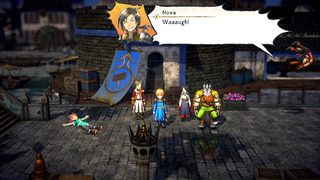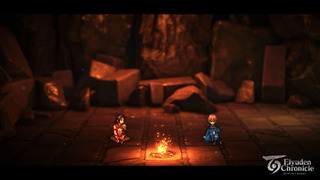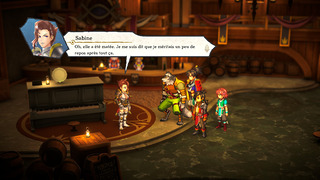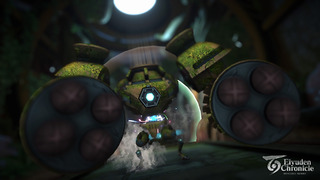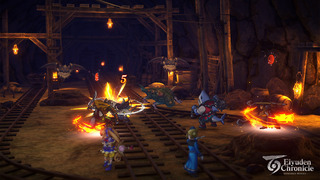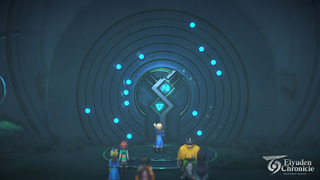Braveheart
As we told you in our overview, the story takes place in the Allraan region where war rings the door to the destiny of young Nowa, a boy from an isolated village. While he joins the guard to go in search of powerful artifacts, he is caught, despite himself, in a torrent of events where the boundaries of friendship and alliance are no longer so clear.
Let me be clear, I was not transported by the story of the game, because, in my opinion, it sorely lacks rhythm. Everything is fast, underused, while other moments take a crazy amount of time for little interest. We are catapulted into the introduction of the game which takes up almost 25% of the running time and despite the fact that the war literally explodes in the faces of the protagonists, we feel a kind of strange lightness emanating from the dialogues. As if no one really cares or that the stakes aren't that high after all. Even when the protagonist's hometown is on fire, we don't feel any emotion that comes out of this traumatic event.
Advertisement
There is certainly a clever attempt by the developers to make us feel a certain vibration linked to Suikoden 2 in the impossible friendship between Nowa and Seign (which recalls the friendship between the hero and Jowy in Suikoden), but it is brought even further once much too quickly: nothing is constructed and we ultimately only touch on the subject which nevertheless transpires on the screen in all directions.
The desire to revive an adventure worthy of the 90s is really interesting, but the game clearly struggles, in its writing, to produce something new, unique and which has not already been seen and reviewed hundreds of times. For comparison, a title like Sea of Stars was much more complete, because nostalgia was not just the game's identity card.
Despite this, we feel this old school side whether in the villages/towns or the landscapes offered by the game. It's pleasant as long as we don't necessarily decide to focus on details like the sprites of NPC which are repeated quite often unlike recruitable characters. Can we still appreciate the charm of the game? Of course, but if some will be “under the spell”, others may find it quite generic overall.
The strategist
Exploration
Advertisement
There are almost none. The game is a nice straight line through most of its work. You go from point A to point B to return to A, etc. Besides, you can try to go faster than the music, but the game will remind you that you didn't talk to that thing or that you didn't look at the tent before going around the back… In short, don't expect to explore despite the fact that the game offers a rather open world, but cruelly empty.
Special mention to inventory management which is simply incomprehensible in 2024. Limiting an inventory to 30 places without really having the possibility of increasing it is an aberration without a name and which gives you the brilliant mention when opening a chest: “ Inventory full.” We are also on 30 objects, which includes equipment, objects usable in combat, runes… We might as well tell you that we are having a very good time using the game's repository because we clearly only have that to do, of course!
Recruitment
We spoke to you briefly about it, but the recruitment is very classic and unfortunately sorely lacks depth. If this was already the case in Suikoden, we regret that 25 years later, no effort has been made to introduce the heroes in a slightly more interesting way. I take for example a character suddenly decides to put his life in my hands because I proved to him that it was entirely possible to kill 5 wild boars… Very often, most of the characters join us for rather imprecise reasons ( succeed in a quest) or even just because you speak to them.
The fights
We once again find a very “Suikoden” representation with in particular the possibility of setting up a team of six playable characters divided into two lines. The combat takes place turn-based and a line at the top of the screen symbolizes the moment when your characters perform their actions (the same goes for enemies). One might believe that there is a certain strategy in knowing who attacks when, but this remains mostly anecdotal given the simple difficulty of the fights. There is also a “Hard Mode” which simply increases the damage of enemies. Positive point and sometimes annoying, theAI is far from stupid and tends to attack your weaker troops when possible (for example, after resurrecting an ally, you can be sure that he will be in focus).
Each fighter has the ability to use skills via lenses. These are unlocked and organized as you level up. It is possible to buy some and customize your characters a little. It is also possible to use passive lenses which will increase your abilities.
Concretely, you spend your time typing to increase your skill bar, then use your skills and repeat. There is indeed the possibility of making combos between different group members, but, again, the result is somewhat perplexing as the difference in damage is not marked enough.
We could talk about magic which uses the different elements (water, earth, fire, etc.), but which costs far too expensive to be used commonly. But here again, the results are not interesting enough to really say that the game is worth the effort.
It should be noted that the game offers an “Auto” mode so that your allies attack themselves like in the best gacha. I really don't see the point, because the fights against monsters are rather rare. I happened to go through an entire area without having the slightest fight at times; It’s totally destabilizing. Then suddenly you have 4-5 fights in a row, then nothing.
The game offers a certain diversity in its combat, notably with major wars and even duels. I found the latter quite nice, with a good atmosphere and catchy music. Great wars are just the opposite, deadly boring, without strategy or stakes. We could have found a system similar to SaGa Frontier 2 and its great battles (even if it means typing in the ancestor), but none of that. We just send our troops without really knowing what works or what doesn't. So of course, later, it is possible to customize your troops, but it remains rather simplistic and a little too simplistic.
Mini-games
What would a J-RPG without mini-games? A good game.
More seriously, there are a few mini-games during the adventure ranging from the sand boat race to culinary challenges or even the timeless card games. Let me be clear, it is possible to spend your time doing something else. It's pleasant overall, especially the card game and Beigoma which is none other than the ancestor of Beyblade.
The castle
Once you are at the head of the resistance (again, we don't know why you and not the 32 much more qualified officers, but hey…), you will have the chance to manage your own castle and build there , via resources, new neighborhoods. The opportunity to create your own little home, but above all the obligation to have the right allies in order to develop your base. Resources are generally found via dungeons and are much more plentiful than combat.
60 fps
One might say that a game of this ilk in terms of graphics would not be really difficult to run and that is indeed the case. Finally, especially on PC (the test version), because unfortunately this is still not the case level from the SteamDeck. We see many FPS losses on the portable console of Valve and I heard that this was also the case on Switch. It's a real shame for a game that clearly shines on portable consoles.
Concerning the PlayStation and PC versions, no framerate issues on the horizon. On the contrary, do not hesitate to limit the FPS on PC, because I tended to have accelerated animations in certain passages.
Finally, we wouldn't play Suikoden 2?
Eiyuden Chronicle: Hundred Heroes is not a bad game in itself, but a project that clearly lacks depth. The game is a love letter to the era of Suikoden, but at no point does it attempt to declare its love forcefully. Rather, he is content to repeat concepts without adding depth to them. We think in particular of the multitude of allies which remains the strong point of the saga, but why use such absurd limitations in the way of acquiring them?
Besides that, the writing is not necessarily bad, but everything is catapulted in all directions, for no reason, once again without depth. We find some more epic moments, but I clearly expected more than to take concepts seen and reviewed in the hope that the Suikoden 2 fan will say “I HAVE THE REF! “.
I sincerely think that the game should have been worked much better, especially since it was the last work on which Yoshitaka Murayama worked. Perhaps we should have focused less on stretch goals and more on the main content. In short, the result is there and if I come away somewhat disappointed, that doesn't mean that it makes it a bad game or that others won't enjoy it. I think that without being too careful and having really liked Suikoden, we can only find a certain happiness, but I sincerely wonder if we should not relaunch Suikoden 2, in fact.
Eiyuden Chronicle: Hundred Heroes is available for 49.99 euros on Steam, PlayStation 4 and 5, Xbox One and Series X|S as well as on Nintendo Switch.
This test was carried out on PC by Glaystal via a copy offered by the publisher.
